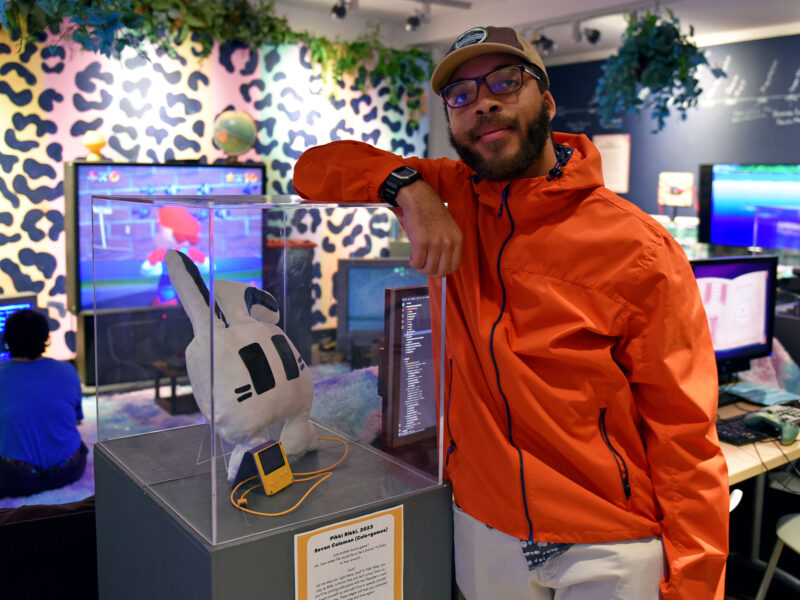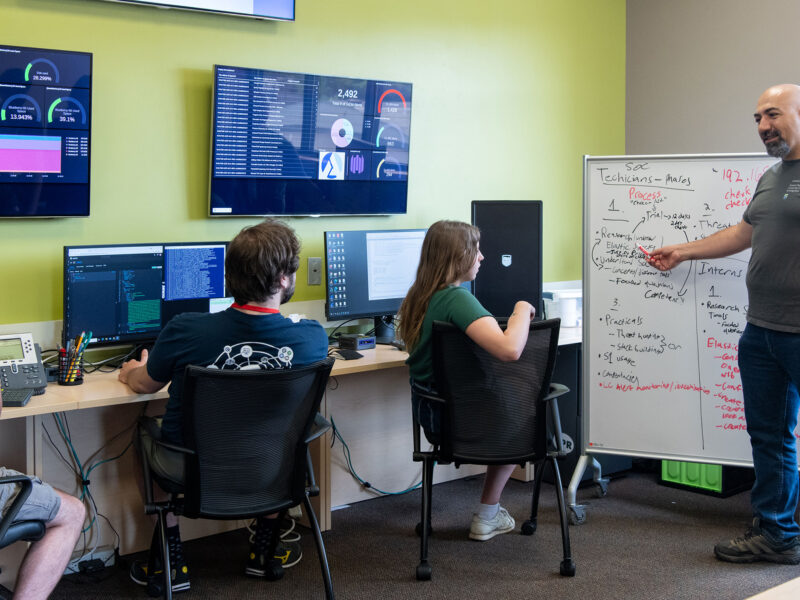Harnessing Big Data to Combat Climate Change

The National Science Foundation (NSF) awarded Dr. Narine Hall and Champlain College, along with scientists at the University of Maine, University of Maine at Augusta, and the University of Vermont, a $4 million grant to solve problems of national importance by analyzing massive amounts of climate data.
Champlain students majoring and minoring in Data Science will be on the frontline of a huge social impact project that sets out to understand the effects of climate change on the biodiversity and economies of rural areas. Under Dr. Hall’s supervision, students will be analyzing and exploring climate-related data, building big-data pipelines, applying machine learning and deep learning algorithms to help inform and assist researchers at UVM, UMaine, and UMA in deciding what future steps must be taken to protect our environment and the livelihoods of our rural populations.
Ecosystems in Flux
The research behind this grant brings together two prevailing trends that will impact human society in the near future: climate change and the data revolution. Wildlife is on the move as the climate warms. Shark and seal populations are increasing in formerly chilly New England waters. Cases of Lyme and other tick-borne diseases are rising in the northeastern and upper midwestern United States. Moose are lumbering up to parts of the Arctic where they’ve never been before.
“Climate change is impelling a universal redistribution of life on Earth,” says a report in Science magazine. How will these massive shifts in biodiversity affect rural communities that rely on farming, fishing, forestry, and tourism—areas where growing seasons are fluctuating, new diseases and invasive species are appearing, and livelihoods are diminishing? These vast alterations in the natural world are what the students and experts at Champlain, UVM, UMaine, and UMA will be examining. Their findings will help future generations, who make a living off the land, better predict and prepare for a changing climate.

Using Big Data to Solve Big Problems
This large project connects data science to other disciplines, like biology, zoology, and economics. “As data scientists, some of our best outcomes occur when we make new technology and innovation accessible to different fields,” says Dr. Narine Hall, Director of Champlain’s Data Science Program. Champlain Data Science students will take massive amounts of messy spatiotemporal data (data that covers both space and time), clean it up so it is usable, and explore and identify interesting patterns in it. Dr. Hall and the team will also build data integration tools that will track shifts in species ranges in response to climate change, and make them widely available for other scientists and practitioners to use.
Throughout the project, students will work closely with the experts at the research schools. “They’ll communicate their findings and collaborate with graduate students, which, in a few years, they might become,” says Hall.
Collaborating Across Industries and Disciplines
Dr. Hall’s career sits at the crossroads of industry and academia, research and teaching. “There’s nothing I love more than a really good challenge,” says Dr. Hall, who’s comfortable working in any environment, whether it’s consulting for start-ups, coding programs that provide instant feedback on her students’ big data projects, or collaborating on research grants like the NSF one. She is dedicated to building connections across industries, disciplines, and technologies; it’s a passion she passes onto her students. “Through the NSF project, we’re building connections between schools and bringing people together at different stages of their careers to solve interesting problems,” she says. “Collaboration is the cornerstone of everything we do in data science.” She recently joined a collaborative hub for data science innovation in the Northeast and is working to build a more diverse, equitable, and inclusive data science community.
“We’re going to be collaborating with an incredibly smart group of people on the NSF grant project,” says Hall, who will be working with Nicholas Gotelli, the George H. Perkins Professor of Zoology, Meredith Niles, assistant professor of food systems, and Laurent Hébert-Dufresne, assistant professor of computer science, all at UVM; Timothy Waring, associate professor of social-ecological systems modeling, at UMaine; and Matthew Dube, assistant professor in computer information systems, and Laura Corlew, associate professor of psychology, at UMA.
While Champlain isn’t widely known as a research institution, Hall was determined to secure this opportunity for our students. She worked with Dr. Scott Stevens, Dean of Champlain’s Division of Information Technology & Sciences, to turn the grant proposal around almost overnight. “Dr. Hall continues to expand the domain of data science,” says Dr. Stevens. “She has developed programs, tools, and curriculum to introduce the concepts to first-year students while engaging upper-level students in projects like this NSF-funded research.”
Preparing Students for Their Careers
Over the next four years, the grant allows Champlain to offer more than 2,800 hours of student employment to our Data Science students. “The experiential learning opportunities these individuals will have are essential to their understanding of the field, and to the mission of Champlain College,” says Dr. Leslie Averill, Vice President for Academic Affairs & Chief Operating Officer at Champlain.
Data Science For Good
While the Stiller School of Business at Champlain has focused on “business for good” for years, this new grant introduces the same positive force into our Data Science curriculum. Hall, an expert in data science and machine learning who has worked with AI specialists like Faraday, Wolfram Research, and IBM Watson, is determined to make data science more accessible.
This project applies machine learning and artificial intelligence to solve problems that will better our planet and the people who inhabit it.
Dr. Narine Hall
Machine learning experts and engineers can be expensive. So while big companies like Netflix can afford to hire specialists and innovate intensively, smaller businesses and nonprofit organizations “are left at the tail end of the artificial intelligence revolution,” says Hall. The collaboration with UVM, UMaine, and UMA is just one way she plans to change the course, or better yet—flatten the curve (a term she recognizes is gaining much more traction these days).
In case you missed it, Hall and our Data Science program also secured a large grant from Google to train the next generation of data scientists and make data science and machine learning more accessible. You can read that story here.
Interested in a career in Data Science? Champlain was one of the first colleges to offer a Data Science degree at the undergraduate level. Find out more about our program on Champlain’s website.
Author
More Inside The View
Ideas
From the minds of our students, faculty, and alumni.
News
The latest from Champlain College.
People
Champlain is more than just a place; it's a community.
Places
On campus, in Burlington, and beyond.
Events
Check out our many campus events and get involved! Refine your search by using the filters or monthly view options.


